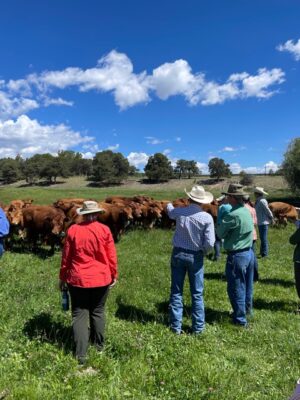While many newcomers to the Arkansas River Valley admire the scenic beauty of the rolling agricultural lands, and the bucolic peace of cattle grazing on pasture land, the fact is — agriculture is a business with real economic impact. Surviving as a farmer or rancher requires real knowledge and an element of risk. The recent Grazing Planning and Soil Health Workshop at the Poncha Springs Town Hall featured keynote speaker Greg Judy and was filled with enthusiastic, note-taking members of the local agricultural community.

Greg Judy was the featured speaker at the Grazing Planning and Soil Health Workshop. Photo by Charlie Cain
Judy, who with his wife Jan runs a grazing operation on 1,660 acres of leased and owned land in Missouri, is known around the world in agricultural circles. The author of three books on successful agricultural practices, Judy teaches the benefits of planned grazing, multi-species grazing, custom grazing, agroforestry, and wildlife management.
Judy spoke several times during the conference, dispelling misconceptions about grazing, and especially about how grazing mixed stock of cattle, sheep, and goats actually rejuvenates soils and pastures; the combination of hooves and different grazing patterns compliments each other. The information came so fast that many attendees said they couldn’t take notes fast enough.
“The workshop was a result of several other projects we have in the works as a collaboration between Central Colorado Conservancy and the Upper Arkansas Conservation District. Both organizations are involved in the leadership of the Upper Arkansas Watershed Planning project (UAWP),” said Central Colorado Conservancy Agriculture Projects Manager Natalie Allio.

A field walk with keynote Greg Judy was part of the agenda for the Grazing Planning and Soil Health Workshop. Photo by Charlie Cain
Allio explains that there is an agriculture component to the watershed planning that has included a needs assessment. “As part of that assessment, we asked the ag community what topics they would like to learn more about. The workshop curriculum was a result of their preliminary feedback.
The workshop was made possible by grant funding through Common Ground and sponsorships from NCAT-Soil for Water, Colorado Association of Conservation Districts, Chaffee County Cattlemen’s, NRCS, CSU-Extension, and Piñon Vacation Rentals.
“It was a big effort to organize this to focus on grazing and planning soil health,” said Allio. “We got great feedback from the participants.”
Asked whether the kind of planned grazing that works in Missouri could work in Colorado, she added, “It depends on where you’re doing it. Look on the east side of Holman where Brady Everett is grazing. Jeff Williams is doing strip grazing with a small number of cattle. [Everett] also does it in the fall on his big field off U.S. 291 when he brings the cattle down, using a single string electric.”
“We can’t do it as intensively here as in Missouri but it does work here,” she added. “You can improve the forage on the land but there is a difference between soil that gets 13 inches of moisture and 40 inches.”
There is a difference between intensively grazing a field and intensively managing it. Letting fields rest is essential so they can recover is essential. “You have to let it recover,” she added. “Here we rotate too soon… that’s when we risk the soil. The techniques have to be adapted to our dry environment and dry rangeland.”
It all comes down to education, says Allio. “There is so much we can learn. We got feedback that this is great, telling us they want to hear from someone who knows how to do it here.”
All was not classroom instruction; workshop attendees also accompanied Judy on a field walk at the Lewis ranch.
Also presenting was Rangeland Management Specialist with the Natural Resources Conservation Service (NRCS) Josh Tashiro. Tashiro covers the western portion of the Arkansas River Valley and South Park. He works with area farmers and ranchers on rangeland ecology and on western U.S. special projects.
Rounding out the presenters was CSU Agriculture Agent in Routt County Todd Hagenbuch, who talked about the importance of succession planning for farms and ranches so that the operation can stay in the family.







Recent Comments